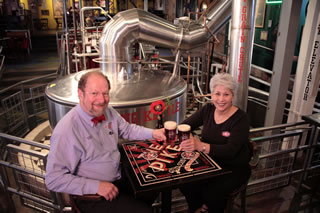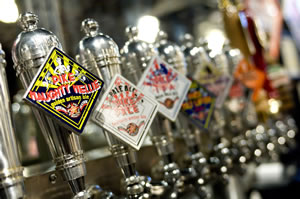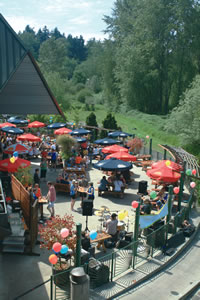On the Northwest Brewpub Trail

By Shelley Seale
Cheers! Pike Brewery owners Charles and Rose Ann Finkel enjoy some down time at their Pike Place brew pub. Photo courtesy of Pike Brewery
“Beer is proof that God loves us and wants us to be happy,” Benjamin Franklin famously remarked. It’s a philosophy that the Pacific Northwest heartily embraces, judging by the recent craft beer craze and sheer number of small brewpubs in the region.
America’s love affair with beer existed long before Franklin, as colonists brought shipments of the beverage from England. In 1612 Adrian Block and Hans Christiansen established the first known brewery in the New World in New York, and the adoration continued until the fateful hand of Prohibition intervened. Since its repeal in 1933 brewing continued, but the small brewery fell by the wayside in drastic numbers over the next five decades, in favor of huge brewing giants such as Coors and Anheuser-Busch.
First Brewpubs and Festivals
Enter Bert Grant, a colorful Scotsman who resettled in Washington State and opened the first brewpub in the modern U.S., in Yakima in 1982. It was the start of a new wave of craft microbrew pioneers.
A microbrewery, by definition, is a small brewery that produces less than 15,000 barrels of beer annually. As microbrews proliferated, the broader category of craft beer was created, defined by traditional brewing methods, high quality, and lack of unmalted additives such as rice or corn.
Although Bert Grant’s Ales rejuvenated the brewpub scene, small brewing was already getting started in Oregon, birthplace of the craft beer revolution. In 1983 Oregon law was changed to allow breweries to sell beer on the same premises where it was brewed, largely due to efforts by veteran winemakers Nancy and Dick Ponzi. Once the legislation was passed, the Ponzis partnered with UC Davis Brewing Sciences graduate Karl Ockert and opened BridgePort Brewing Company in a century-old rope factory in downtown Portland.
Ockert began experimenting with recipes that are still going strong at their 25-year anniversary. BridgePort’s signature ale is the IPA they started with — the first American brew to win in the 200-year history of the Brewing Industry International Awards.
The first Oregon Brewers Festival in 1988 drew 15,000 people to sample beers from 13 breweries; by 1990, with more craft breweries and brewpubs per capita than any other city in the United States, Portland was proclaimed “America’s Microbrew Capital” but unofficially, it’s known simply as “Beervana.”
 Brewpub Culture
Brewpub Culture
Indeed, Portland’s brewpub culture is a bit more of an obsession than an industry, thriving on a voracious thirst for great beer and the bounty of high-quality local ingredients.
The number of microbreweries and brewpubs in Oregon is truly impressive, and many are extremely family-friendly destinations serving great food. Although Portland has the highest concentration of brewpubs, much of Oregon’s beer trail lies outside the city. On the North Coast lies Pelican Pub & Brewery in Pacific City, the only oceanfront brewpub in the Northwest.
From its location right on the beach under the shadow of the enormous Haystack Rock, Head Brewer Darron Welch makes annual and seasonal beers using recycled rainwater and locally sourced ingredients. Ninety-nine percent of his hops come from the Yakima and Willamette Valleys, where Welch often drives to get the fresh hops as soon as they’re harvested.
“They’re three hours off the vine when we start brewing,” he says. He’s also created new taste profiles, such as his Surfer Summer Ale that started as a one-time offering when an English company gave him some free hops. The beer took off with customers and Welch brings it back every summer, “or there would be rioting!” he laughs. “It feels really good, because it feels like I introduced the style to North America.”
Welch’s love of beer began in Germany when he was 18.
“Before that, I thought I liked beer, but I was wrong. I loved beer, but only great beer.” He began experimenting with home brewing — Doryman’s Dark Ale is one of his original homebrew recipes — and in 1995 answered an ad for a head brewer, partnering with Jeff Schons and Mary Jones to open the coastal brewpub.
In Bend, Deschutes Brewery opened in 1988 as a small brewpub serving locals their favorite beers and has evolved into an enterprise that sells beer across the western U.S. They recently opened a second location in Portland’s Pearl District. The original Bend facility offers tours of the brewing process and free samples four times a day, where you can try flagship staples such as Mirror Pond Pale Ale, or limited specialty batches like The Abyss or Hop Trip.
Deschutes owner Gary Fish says, “Larry Sidor, our Brewmaster, and I periodically have private tastings where we sit in his office and drink whatever esoteric beer we might have recently come upon, solving all the brewery’s and many of the world’s problems at the same time. We have attempted, with all our products, to push our own limits in beer making. We have created beers that will age like wine, using many non-traditional ingredients.”
It’s not uncommon to find the flavor of molasses, licorice, bourbon or vanilla in a Deschutes brew.
Brothers Mike and Brian McMenamin have one of the most recognizable names in Northwest beer. They opened McMenamins Hillsdale Brewery & Public House in 1985, and today operate an ale empire that includes more than 50 pubs throughout Oregon and Washington — some housed in unexpected places such as abandoned schools, lighthouses and churches — as well as eight theaters and eight hotels.
“Be wary of things too formal, too complicated and too orthodox” became the company’s rallying cry — one that seems worthy of Ben Franklin himself.”
Over time we’ve learned that what makes a good pub is the journey that you take to get there,” say the McMenamins. “We continue to happily tweak the notion of what a pub can be.” The newest venture for the brothers is the Crystal Hotel, set to open in downtown Portland in mid-2010, just down the street from the legendary Crystal Ballroom.
McMenamins can be found throughout both states, as can Pyramid Breweries. Founded in 1984 as Hart Brewing in Kalama, Pyramid created the first year-round wheat beer in the U.S. since Prohibition, but is also well-known for its Pale Ales and Hefeweizen. The Great American Beer Festival dubbed the brewery innovators in the fruit beer category, for the unique Audacious Apricot Ale.
With breweries in Seattle and Portland — as well as California — Pyramid underwent a brand makeover in 2009, renaming several of its beers and unveiling new, eye-catching labels.
“As a craft pioneer, Pyramid is extremely passionate about our brewing and we are continually inspired by the cities where we brew, live and play everyday,” says President Mike Brown. “The robust craft beer business continues to grow with new breweries and brands arriving everyday.”
 Redhook Ale Brewery got its start in 1981, when Gordon Bowker and Paul Shipman started brewing beer in an old transmission shop in Seattle. The original batch had a curious banana flavor that was met with surprise and confusion — less than 1,000 barrels were sold.
Redhook Ale Brewery got its start in 1981, when Gordon Bowker and Paul Shipman started brewing beer in an old transmission shop in Seattle. The original batch had a curious banana flavor that was met with surprise and confusion — less than 1,000 barrels were sold.
According to the pair, “Early missteps led to a cult following.” After subsequently releasing a porter and an IPA, demand outgrew the small facility and the brewery moved into 26,000 square feet in the former Seattle Electric Railway building. They called the new pub the Trolleyman.
Redhook’s current state-of-the-art brewery in Woodinville puts out craft beer modeled after spicy Belgian and British ales. The ESB is the flagship brew, styled after the “extra special bitters” served in pubs throughout the U.K. Visitors can take a formal tour of the facility for a dollar, which includes five samples and a souvenir tasting glass to keep, and minors are welcome.
In Seattle’s historic Pike Place Market, a different sort of brewer emerged. Charles Finkel and his wife, Rose Ann, operated an importing company in the 1970s to satisfy their own thirst for authentic, quality beers. The couple was frustrated by the lack of great American beers, and Finkel became the first modern contract brewer in the country, creating and exporting his own labeled beer out of existing breweries.
Finkel greatly influenced craft brewers to follow by introducing them, and the American public, to the glories of how good a beer could be. Finally, in 1989, the Finkels opened the Pike Place Brewery in a former bawdy house, to create world class ale in the traditional European style. They even have a Seattle Microbrewery Museum downstairs.
Organic Brewing
In recent years, a new and increasingly popular concept is organic brewing. Portland’s Laurelwood created Oregon’s first certified organic beers, and Head Brewer Chad Kennedy prides himself on using only the finest ingredients to create ales such as the Tree Hugger Porter and Free Range Red. Every beer made at the Roots Brewing Company is organic, and Brewmaster Craig Nicholls has gained wide recognition for his use of surprising elements such as roses, juniper branches and sage.
 Nicholls is also committed to sustainable business practices, supporting local organic farmers and incorporating an extensive recycling program.
Nicholls is also committed to sustainable business practices, supporting local organic farmers and incorporating an extensive recycling program.
Hopworks Urban Brewery also embraces such practices — even extending to the building itself — Portland’s first “Eco-Brewpub.” The bar, dining booths and other furnishings are made from material salvaged during renovation, and the reflective roof provides a substantially cooler environment.
Elliott Bay Brewing Company was the first brewery in Washington to produce certified organic beer, using 100 percent organic barley since 2005. Head brewer Doug Hindman reports that organic beer costs at least 30 percent more to make because the ingredients are more expensive; but most of that cost isn’t passed on to customers because distribution isn’t a big cost, with most sales directly at the brewpubs.
Both Elliott Bay and Hopworks incorporate sustainable business practices such as composting food waste, recycling waste oil into biodiesel, and reusing spent grain — letting you save the planet, one beer at a time.
Freelance writer Shelley Seale makes full disclosure that she may have sampled one or two beers while writing this article, but it was purely for research purposes; and thanks her boyfriend Keith Hajovsky, for his generous research assistance. She can be reached at shelleyseale.com.



